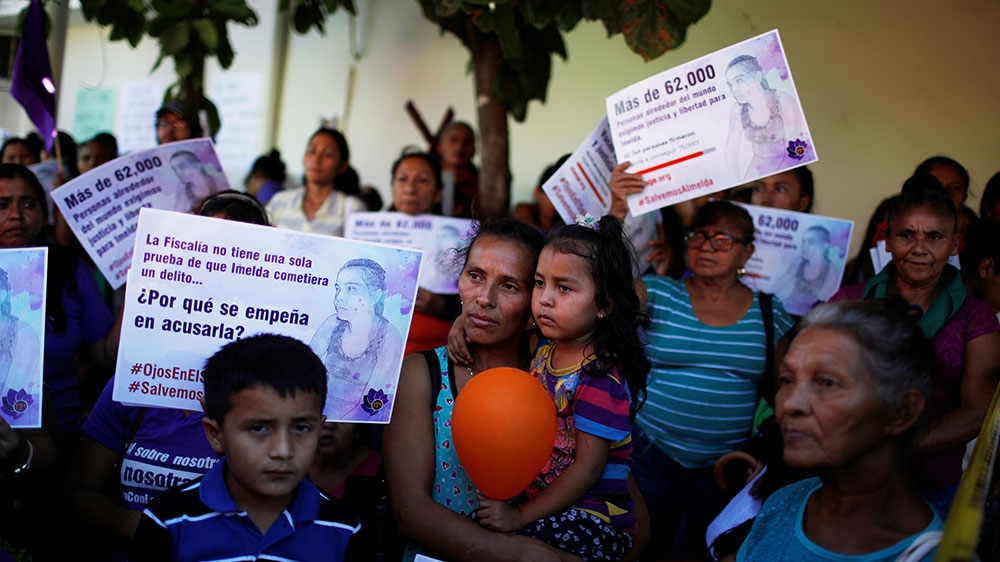
A Salvadoran rape survivor accused of attempting to abort her abuser’s baby was released on Monday after a judge found her not guilty on reduced charges in a case that tested the country’s strict enforcement of a total ban on abortion.
Twenty-year-old Imelda Cortez became pregnant in 2016 after years of being raped by her 70-year-old stepfather. In April 2017, she gave birth to a baby girl in the toilet. At the time, she did not know she was pregnant, Cortez said. When she went to the hospital, a doctor accused her attempting to have an abortion and reported her to authorities.
While at the hospital, she confided in officials about the years of sexual abuse at the hands of her stepfather. Doctors and officials doubted her story, but a DNA test proved him to be the father of her child. He now awaits trial for aggravated sexual assault of a minor.
Cortez was originally charged with attempted aggravated homicide, which carries a sentence of up to 20 years in prison. Her lawyers insisted that there was no evidence that proved that she induced an abortion or that she intended to harm her baby.
But judges have taken a rigid understanding of the country’s abortion laws since the Central American nation fully criminalised abortion in all cases in 1998, sending dozens of women to prison for suspected abortions.
 |
| Lawyers have identified at least 24 women who are currently imprisoned for abortion related crimes in El Salvador [Jose Cabezas/Reuters] |
“Imelda’s case is only one, and right now she’s the one who is getting attention because of the extreme cruelty involved in her circumstances,” said Paula Avila-Guillon, director of Women’s Equality Center, an organisation that supports reproductive rights around the world.
“Imelda’s story is not happening in a vacuum. This is part of a systematic persecution of poor women by the government of El Salvador. She’s part of a group of women who have been wrongfully accused because of the stigma around reproductive health,” she added.
“These laws, and the wrongful interpretation of these laws by judges who clearly don’t know anything about women’s issues, are causing so much damage to families and to people,” said Avila-Guillon.
24 women imprisoned
On Monday, the prosecutor and the defence reached an agreement to reduce the charges to child abandonment. A judge then found her not guilty of the lesser charge. Cortez, who had spent more than a year and a half in prison, was immediately released.
“The decision of head judge is an important precedent in the fight for the rights of women,” said lawyer Bertha de León after the decision.
Through pressure from local and international human rights organisations, five women convicted of abortion-related crimes have been released in the past year, in what lawyers and activists believed could indicate a loosening of the country’s rigid legal interpretation of the total abortion ban.
“It’s changing the perspective,” Avila-Guillon told Al Jazeera. “[Cortez’s case] has created a lot of sensitivity about the fact that women cannot access abortion even in cases of rape.”
The decision of judge is an important precedent in the fight for the rights of women.
Bertha de Leon, lawyer
Lawyers have identified at least 24 women who are currently imprisoned for abortion related crimes in El Salvador. Most of these women, including Cortez are from poor neighbourhoods, which means they lack access to proper healthcare and often can’t afford a good lawyer. In many cases, judges convict these women without solid evidence against them, according to local activists and lawyers representing the women. But the release of Cortez may show that this is changing.
During a preliminary hearing, Cortez’s legal counsel requested that the trial be suspended for a lack of evidence. In September, a judge denied their petition. The trial was scheduled for November 12, but was postponed until December 17 when the prosecutor called in sick. Hearings for Cortez were rescheduled at least eight times, according to lawyers who say that doing so has hindered her access to justice.
But on Monday, Cortez finally walked free. Outside a crowd gathered to support her, chanting, “Imelda is not alone. We, the defenders, are here.” Among the group were women previously imprisoned under the country’s abortion laws.
Activists hope the release of Cortez now indicates a potential loosening of these harsh restrictions.
“We hope that the judges have the capacity to give a verdict with a human rights approach, listening to the allegations from a juridical and scientific perspective and that they don’t give sentences based on prejudice,” said Salvadoran activist Keyla Caceres.
Maira’s case isn’t unusual. In 2017, El Salvador sentenced a rape victim to 30 years in jail after a she had a stillbirth. pic.twitter.com/Ovddnvhf71
— AJ (@ajplus) March 14, 2018












